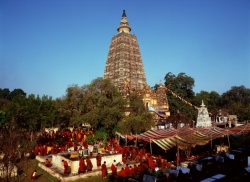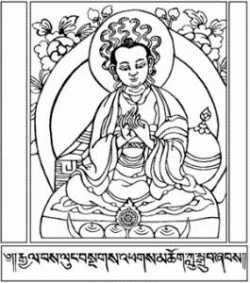Snapshots of Buddhism in the West
By Gesar Temur
When I had a chance to study for an honors degree in Asian Studies, I chose to study the attraction of Westerners to the Buddhist teachings in Adelaide, Australia, and was able to carry out a small study amongst the students at Buddha House, an FPMT center there.
My interest in wanting to find some reasons for the development of Buddhism in the West, and in particular at Buddha House, arose from a series of questions:
Why has Buddhism been the fastest-growing religion in Australia, as shown in the latest census? Why do large numbers of Australians of non-Asian background go to local Buddhist centers? Why is the general public being exposed to Buddhist information in the media?
Why are there are more and more Westerners in Australia who are interested in Buddhism? Why have some actually become Buddhist? Is this trend based on philosophical interests or making sense of personal experience? What does Buddhism really mean to them? How is it possible and is it relevant for an ancient Eastern religion to become popular in the lives of modern Australians? How have they translated these beliefs into their everyday life?
Having spent much time researching the literature from studies conducted in the U.S. and Europe, I carried out 20 interviews with students who regularly attended Buddha House, to see if these local findings mirrored those from overseas. These overseas findings stated that the main focus for Westerners is the teachings themselves. It was interesting to note that in my interviews, all participants stated that they themselves see and practice Buddhism as a philosophy or a way of life which they apply to their daily lives.
In all religions, it is argued that faith and belief are paramount, along with the self-transforming aspect. In Buddhism however, faith is an expression of trust or confidence, especially in the Buddha and his teachings. But, as the Buddha himself recommended, everything must be looked at critically and tested against one’s own experience.
As one person said, “I see Buddhism as a philosophy of life. It is not a dead philosophy, but I can question and experience it. It makes me be more responsible for my actions. There is no magic pill. […] but I see Buddhism even more as a psychology, a psycho-spiritual therapy.”
Others commented on the value of ritual and ceremony when Buddhism is seen “as a way of life”:
“I think the attraction of Buddhism for me is Buddhist teachings and the psychology of it, and a little bit of the ceremonial things; […] really, I practice Buddhism as a philosophy, I don’t see the ceremonial stuff is necessary, but I don’t completely ignore it, I show my respect.”
And another shared, “I am not interested in ceremonial because I’ve done that before. The physical ‘exercise’ might be useful, but I don’t think it would be necessary for my own practice. […] As I have understood it, Buddhism is not about someone who creates the world and who is responsible for everyone’s actions, but the philosophy of Buddhist teachings teaches me about how to be a better person. […] I mean, when practicing religion; you usually need some sort of worship and ceremony. That’s not for me. Instead Buddhism is similar to Western psychology which is helping people to improve their lives when they face life’s dramas. I see Buddhism more as a way of life.”
In the East, Buddhism is more “formally” practiced in the monasteries by monks and nuns, but in the West, by contrast, it has been brought to so-called “ordinary” people. Most Western Buddhists praise Buddhism as being rational and scientific, grounded on reason and individual experience, rather than absorbing and blending with local Buddhist cultural features and ritual practices.
Never before in Buddhism’s long history has there been so much contact between East and West. In the last 200 hundred years, Buddhism has introduced all of its major traditions into new cultures. Buddhism has entered the West during a time of growing spiritual thirst, and much of the ever-changing story of Western Buddhism can be read as the adoption of the ancient wisdom of Asian Buddhism to combine with the values and ideals of Western culture. A Western form of Buddhism is developing in Western countries and a great number of people have benefited from its teachings, practices and community organizations. There are growing numbers of Westerners joining Dharma centers and attending other Buddhist activities.
In my interviews, people told their stories about the benefits obtained from learning and practicing Buddhism, and Buddhism’s importance to their lives and spiritual connection to the world. One student revealed, “I don’t think I would be me today without Buddhism. Buddhism helps me in every aspect. […] I think Buddhism helped me in understanding my own mind!”
And another confesed, “Practicing Buddhism made me become a nicer person and easier to get along with. I was not like who I am now before I practiced Buddhism. I was short-tempered and became frustrated very easily but, since I started learning and practicing Buddhism, I got to know myself better through reading the Buddhist teachings and doing a little bit of meditation every now and again. I think I have become a better person, certainly better than before. […] I am a more patient and tolerant person.”
Someone elseexpressed a similar sentiment, “Buddhist teachings basically teach me how to be a better person. It’s very practical. It’s enabled me to look inside— at my ego— to improve myself. […] I have become less quick to respond negatively. Also, life’s little dramas do not always need an active response. Many things in life I can just let go more easily.”
And one women said, “I believe that Buddhism as an Eastern philosophy is very similar to the Western psychology which is the most important reason that I came to Buddhism. I think the Buddha’s teachings teach me how to be mindful and loving-kind in daily life. Buddha Dharma teaches me how to cope with anger, too. […] I have benefited from Buddhism so much. I am just grateful to be able to learn Buddhism at Buddha House. ”
As an Asian-born, practicing Buddhist, I see there are hundreds of thousands of Westerners who have adopted Buddhism in its different forms, incorporating Buddhist beliefs and practices into their daily lives. Regardless of what happens in the future, Buddhism in the West has had an influence on and made a significant contribution to its peoples and its cultures. The range of people who have made contact with, and continue to be involved in, Buddhist temples and organisations will grow in various ways and create possibilities for its further adaptation in Western countries leading, in time, to a true Western Buddhism.
Born into a Mongolian Buddhist family, Gesar Temur, began to first intensively study Buddhism at Losang Dragpa Centre in Malaysia and eventually moved to Australia where he was pleased to “see that same religion flourishing in Western society.” His next study will focus on the revival of Buddhism in Mongolia.



